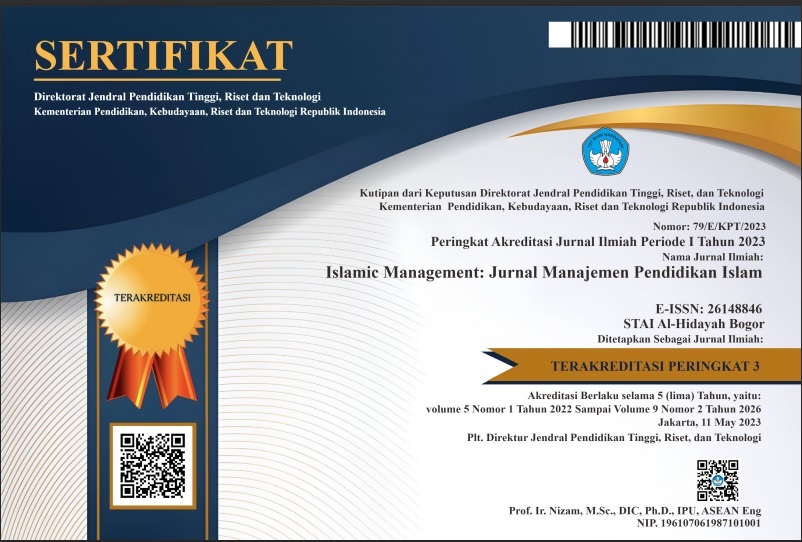EVALUATION STRATEGIES AND APPROACHES IN LEARNING ISLAMIC RELIGIOUS EDUCATION: AN ANALYSIS BASED ON THE ISLAMIC EDUCATION EVALUATION DEVELOPMENT BOOK
DOI:
https://doi.org/10.30868/im.v8i01.7737Keywords:
Evaluation, Learning, Challenges, strategiesAbstract
Evaluation of Islamic Religious Education (PAI) learning is an important element in measuring the success of the educational process that includes cognitive, affective, and psychomotor aspects. However, its implementation is faced with various challenges, such as limited evaluation methods, instrument development, and teacher competence in carrying out holistic evaluations. This study aims to examine the concept, challenges, and strategies for developing PAI evaluation through a literature study approach with descriptive analysis of various library sources. The results of the study indicate that the main challenge in PAI evaluation is the dominance of conventional methods that are less able to capture the affective and psychomotor aspects of students optimally. The proposed strategies include the development of varied instruments, teacher training, technology integration, and collaboration with parents. The implications of this study are the need for improvements to education policies to support the implementation of more effective PAI evaluations that are oriented towards the formation of student character according to Islamic values.
References
Abdullah, M. (2019). Pengembangan Evaluasi Pendidikan Agama Islam dalam Meningkatkan Kualitas Pembelajaran. Jurnal Pendidikan Agama Islam, 15(2), 145-162.
Abdullah, Z. (2020). Penerapan Evaluasi Berbasis Komunitas dalam Pembelajaran PAI. Jurnal Pendidikan Agama dan Kebudayaan, 16(4), 223-237.
Aly, Abdullah, & Innayati, Nurul Latifatul. (2018). Pengembangan Evaluasi Pendidikan Agama Islam. MUP UMS.
Irawan, Y. (2020). Meningkatkan Kualitas Evaluasi Pembelajaran PAI dengan Pendekatan Kualitatif. Jurnal Pendidikan Agama Islam Berbasis Penelitian, 9(3), 178-190.
Ismail, N. (2018). Tantangan dalam Pengembangan Instrumen Evaluasi PAI. Jurnal Pendidikan dan Evaluasi, 14(2), 150-163.
Kusnadi, I. (2021). Evaluasi Berbasis Nilai dalam Pendidikan Agama Islam. Jurnal Ilmu Pendidikan dan Agama, 18(4), 240-252.
Mardiana, S. (2019). Evaluasi Pembelajaran PAI yang Mengukur Sikap dan Perilaku Siswa. Jurnal Pendidikan dan Sosial, 11(2), 99-111.
Mulyadi, H. (2022). Evaluasi Pendidikan Agama Islam di Era Digital: Tantangan dan Peluang. Jurnal Pendidikan dan Teknologi Islam, 8(2), 45-58.
Mulyani, R. (2019). Evaluasi PAI: Pembelajaran dengan Pendekatan Konstruktivisme. Jurnal Pendidikan Islam Indonesia, 14(1), 70-83.
Rahmatullah, I. (2018). Pendekatan Berbasis Karakter dalam Evaluasi Pembelajaran PAI. Jurnal Studi Pendidikan Agama, 12(2), 142-155.
Rahmawati, A. (2021). Model Evaluasi Pendidikan Agama Islam untuk Meningkatkan Karakter Siswa. Jurnal Pengembangan Pendidikan Islam, 5(3), 155-169.
Rahmawati, S. (2020). Strategi Evaluasi Pembelajaran PAI yang Holistik. Jurnal Ilmu Pendidikan Islam, 17(3), 210-225.
Sulaiman, F. (2020). Peranan Evaluasi Format dan Sumatif dalam Pembelajaran PAI. Jurnal Penelitian Pendidikan Agama, 13(1), 102-116.
Suryani, D. (2021). Peran Teknologi dalam Pengembangan Evaluasi Pembelajaran PAI. Jurnal Teknologi Pendidikan, 20(4), 265-278.
Wahyudi, T. (2019). Tantangan dalam Pelaksanaan Evaluasi PAI di Sekolah Menengah. Jurnal Pendidikan dan Kebudayaan, 19(1), 98-112.
Wahyuni, L. (2021). Evaluasi Afektif dalam Pendidikan Agama Islam di Sekolah Dasar. Jurnal Pendidikan Karakter, 10(3), 117-130.
Downloads
Published
How to Cite
Issue
Section
Citation Check
License
Copyright (c) 2025 Muhammad Syahreza Pahlevi, Hafidz Hafidz

This work is licensed under a Creative Commons Attribution-ShareAlike 4.0 International License.
Authors who publish with this journal agree to the following terms:
- Authors retain copyright and grant the journal right of first publication with the work simultaneously licensed under a Creative Commons Attribution License that allows others to share the work with an acknowledgment of the work's authorship and initial publication in this journal.
- Authors are able to enter into separate, additional contractual arrangements for the non-exclusive distribution of the journal's published version of the work (e.g., post it to an institutional repository or publish it in a book), with an acknowledgment of its initial publication in this journal.
- Authors are permitted and encouraged to post their work online (e.g., in institutional repositories or on their website) prior to and during the submission process, as it can lead to productive exchanges, as well as earlier and greater citation of published work (See The Effect of Open Access).






